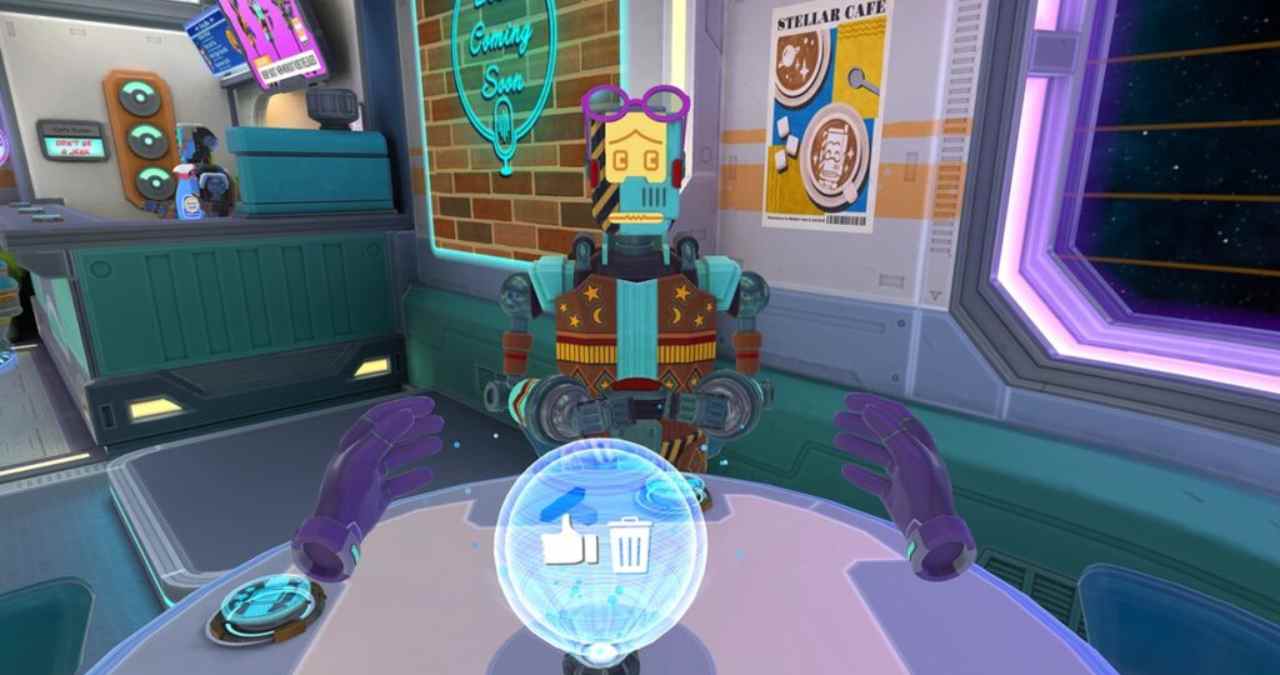Stepping into Stellar Café isn’t like loading a typical VR menu system. Instead, you wander a weird, charming space-station café and talk naturally with no UI prompts, no button pressing, just your voice. The idea feels simple but clever: rip out the dialogue options and let the game listen.
The charm comes from the robots themselves. They aren’t programmed into narrow dialogue slots. Instead, they react, recall things you’ve said, and each has its own quirky aim. Sometimes it’s goofy, sometimes a bit eerie, but always unscripted.
Voice First, Controllers Last
This game is built for Meta Quest headsets, tapping into Owlchemy-style hand tracking and, notably, zero controller input. You don’t click or trackpad your way through tasks. You talk, and if you need to gesture, your hands do the rest. It’s a bold shift in how VR interfaces are designed, leaning hard into voice as the main input.
Chat That Feels Alive
The robots aren’t text-driven bots or bland chatterboxes. They have individual goals and motivations. Players have reported that they remember your name or prior choices. Conversations evolve across sessions. One day, you might be convincing a robot bartender to host a human guest; another, you’re tossing out cosmic drink ideas (“Meteor Mocha,” “Astro Algae Smoothie,” or whatever you make up on the spot).
The studio, AstroBeam, leans on real-time AI to make this work. It’s powered by large language models, currently Google Gemini, though that may change. Your voice is heard, interpreted, processed through LLMs, and turned back into speech and behavior within moments. All in real time.
A Familiar Yet Fresh Layout
Despite the futuristic tech, the setting is comfortably familiar. It feels like a laid-back Job Simulator, but instead of stuffing burgers or labelling files, you’re sitting in a café shooting the breeze with robots. The first level is modest, three patrons, a standup stage, tables with odd interactive bits to play with, but it already gives a sense of lively interaction.
And there’s a daily reset to the cast, so each visit brings new robot personalities and new problems to chew on. It’s casual, playful, and it’s very clearly packed with personality.
Design Grounded in Personality, Not Just AI
AstroBeam’s founder is a former head of Owlchemy Labs (Job Simulator, Vacation Simulator), and the studio makes clear that AI isn’t the creative engine. Instead, the team builds characters from scratch with quirks, backstories, and goals, then leans on AI to bring them to life.
That means you’re not just speaking to a model; you’re speaking to characters with roles, aspirations, and boundaries. There’s AI under the hood but thoughtful design at its heart.
What It Means for VR Storytelling
This isn’t going to revolutionize gaming overnight. The robots don’t gesture or switch accents or use slang the way humans do. But it’s a tangible shift: stepping away from scripts and menus toward something that listens and remembers. If it scales, that could rewrite what we expect from NPCs in VR.
We’re not at flawless naturalism yet, but the tech fills in parts of the gap between chatbot and believable character. It also points to a broader trend: increasingly voice-driven, flexible narratives that reshape how we move and respond in virtual worlds.
Virtual Reality Explorer & Game Reviewer
Always the first to plug in. VRSCOUT dives head-first into the most immersive VR worlds, analyzing mechanics, comfort, innovation, and that elusive “presence” factor. If he says it’s worth it, it probably is.




